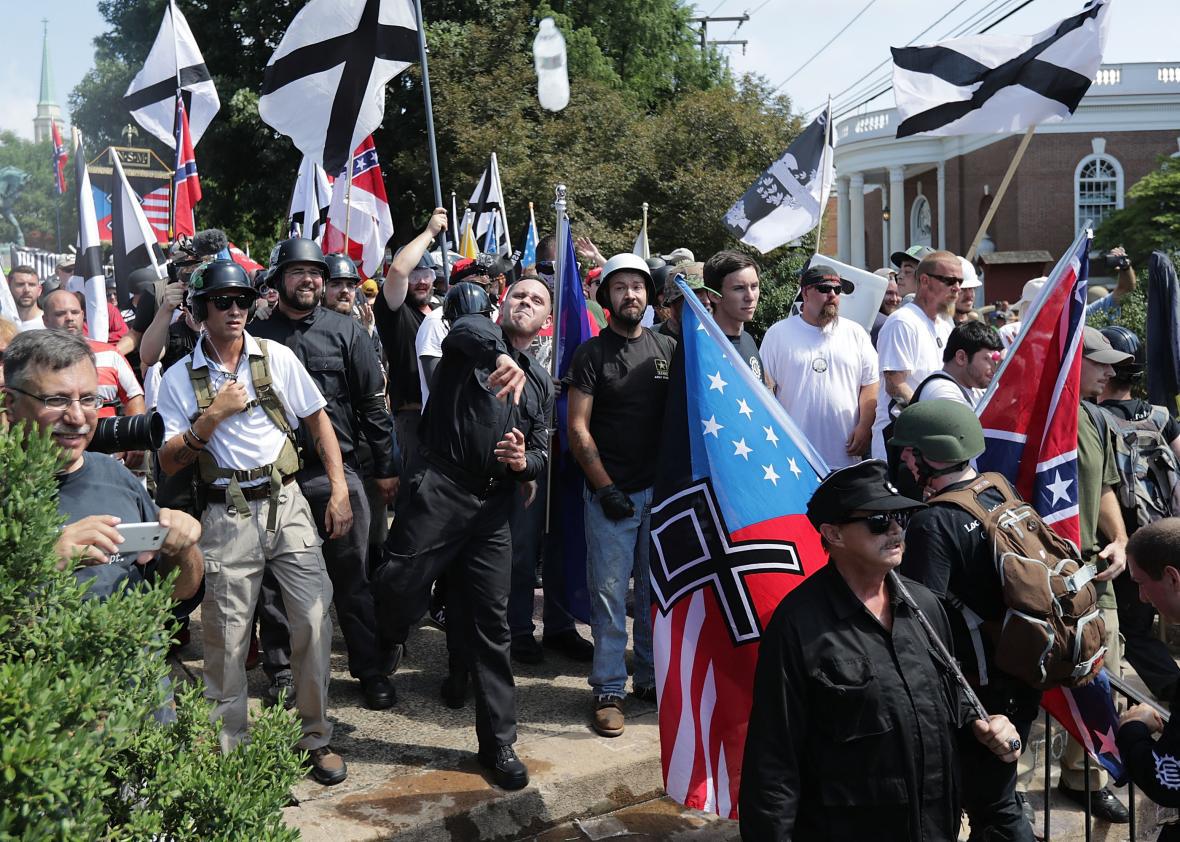Although the recent events in Charlottesville happened 5,000 miles from Moscow, Russia didn’t sit this one out. As has become almost routine after every polarizing U.S. political event in the past 12 months, online Russian propagandists quickly got involved. This time around, they took to Twitter with an army of bots to promote and share extremist right-wing tweets and disinformation.
The Alliance for Securing Democracy, a project of the German Marshall Fund that tracks efforts to undermine democratic governments, monitors a collection of 600 Twitter accounts that are known to be linked to Russian influence, including openly pro-Russian users, accounts that take part in Russian disinformation campaigns, and automated bot accounts that parrot Russian messaging. They found these accounts busy at work in the days after Charlottesville. “PhoenixRally,” “Antifa,” and “MAGA” were among the most common hashtags used by these accounts this week. One of the central themes shared by the Russian-linked accounts after Charlottesville was an accusation, propagated by both the Russian news agency Sputnik and American far-right media personality Alex Jones, that the left-leaning philanthropist George Soros had supported the counterprotesters.
One example of a likely bot was an account under the name Angee Dixson, opened on Aug. 8, the Tuesday before the Charlottesville rally started, as reported by ProPublica. Described in her Twitter bio as a conservative Christian, Angee sent about 90 tweets out a day, in which she vigorously defended President Trump’s response to the rally and shared pictures that allegedly showed violence on the part of counterprotesters in Charlottesville. The account has now been shut down.
“BUSTED! Craigslist Ad Exposes Firm Hiring #AltLeft “Protesters” for $25/Hr,” read one of Dixson’s tweets. That was one of five tweets she sent in one minute, according to the archive link of her account. All those tweets contained links that had been shortened using a URL shortener, which usually requires going to a separate website to enter the URL and generate a new link, and that takes time. The tremendous speed with which Dixson was able to send her tweets indicates that Angee Dixson was most likely an automated bot, not a real human. Even the account’s profile picture was stolen: ProPublica linked it to a photo of a model that at one point was rumored to have dated Leonardo DiCaprio. Though it’s hard to directly link any one bot to its source, “Angee’s” tweets were reported to use similar language from Russian government–backed outlets Sputnik and RT.
The same Russian social media machine that blanketed Twitter with pro-Trump posts during the 2016 presidential election were reportedly at work after Charlottesville, too. Bots were weaponized during the presidential debates to give a false impression of a groundswell of grass-roots support for Trump. Bots sharing pro-Trump–related content outnumbered pro-Clinton bots by 7 to 1 during the third debate between the Hilary Clinton and Donald Trump, according to research from Oxford University’s Project on Computational Propaganda. In the timespan between the first and second debates, more than one-third of the pro-Trump tweets were found to came from automated bot accounts.
Bots also showed up in the days before this year’s French election, when the campaign of the winning candidate Emmanuel Macron reported it was the victim of a massive email hack. The documents spread like wildfire across Twitter, but it was soon reported that an overwhelming number of the tweets spreading news of the hack were from bots. About 40 percent of the tweets containing #MacronGate were found to be actually coming from only 5 percent of accounts using the hashtag. That tremendous amount of activity from such few accounts is usually a clear sign that humans aren’t the ones doing the tweeting. One account reportedly tweeted 1,668 times in 24 hours, or more than one tweet per minute with no sleep. Unless that account was manned by three people who don’t take bathroom breaks, that was probably a bot. Though, again, it’s incredibly difficult to tell how much of this bot traffic can be linked directly to Russia, but there is evidence that it was Russia was behind the Macron campaign hack. In April, the cybersecurity firm Trend Micro found that the same Russian government–linked hacking group behind the infiltration of the Democratic National Committee also targeted the Macron campaign with email phishing attempts and malware.
Bots are becoming a staple of social media as Western countries find themselves embroiled in polarized political debates. Trump’s Twitter followers, after all, are about 59 percent bots or fake accounts, according to TwitterAudit, a website that measures the authenticity of Twitter followers. All of which goes to show that retweets, likes, trending hashtags, and followers shouldn’t be taken as a strong indication of public opinion—and moreover, that virality is hardly a demonstration of genuineness.
